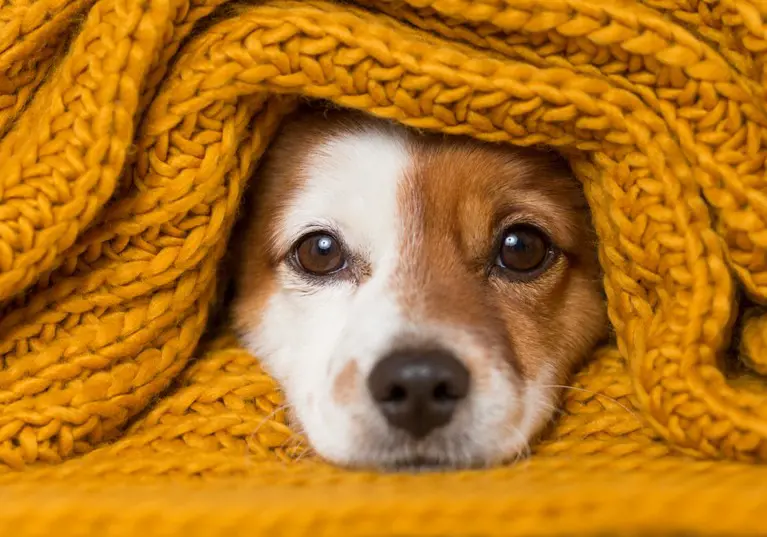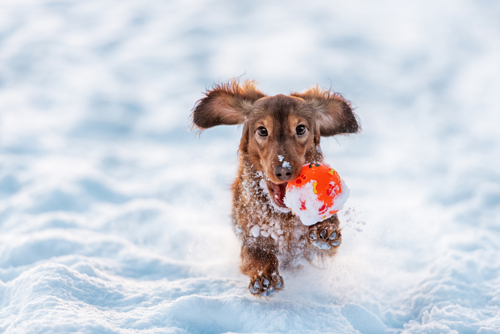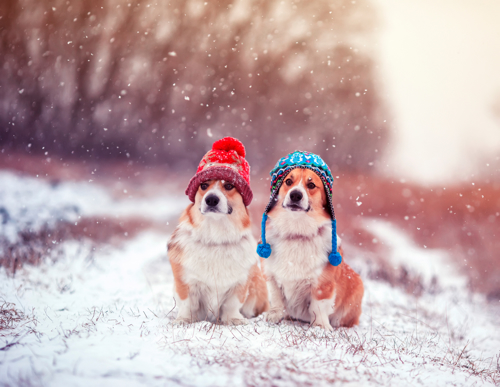Top tips to prepare your puppy for their first winter
8th November, 2022

Got a new puppy? Purely Pets shares some winter hazards and shows you how to keep your playful pup safe this festive season.
Is there anything more adorable than a puppy bounding about in the snow? As cute as that may seem, too much time in chilly temperatures can make your young pup poorly.
But that doesn’t mean you need to lock them away until spring. There are plenty of measures you can take to keep your new four-legged family member safe on even the most bitter days.
As winter approaches, we also start to put up our decorations and consume more festive foods, but these pose more risks to your young dog. You’ll need to be mindful of where you keep your treats and how you decorate now you have tiny paws pattering about.
Read on to discover what winter hazards pose a danger to your puppy and how you can protect them, both at home and out in the cold. You’ll also learn some other ways to keep them fit and healthy, even when they can’t spend long periods outdoors.
As a responsible pet parent, you want what’s best for your new dog, which involves gettingto protect them in case of a sudden accident or illness.
At Purely Pets, we insure puppies as young as 8 weeks old, and there’s no upper age limit, so you can keep them covered through every stage of their life.
Winter hazards for puppies
The glistening ground on a bright sunny day is enough to make any dog owner strap on their boots and head out for a nice long walk, but you’ll need to be extra careful with your playful pup when out and about in the winter wonderland.
As temperatures drop, the number of risks to your puppy rise, including:
- Injuries from slipping and sliding on slushy and icy floors
- Falling into frozen lakes, rivers, and canals
- Paw damage from grit and salt
- A dry nose and mouth because of the dry air
- Swallowing antifreeze from car radiators
- Frostbite if you spend too much time in cold temperatures
- Hypothermia when it can’t control its body temperature
- Weight gain from reduced exercise
There are also a host of hazards around your home as Christmas nears, which you need to be very careful of:
- Dangerous food and drink for dogs, like chocolate and alcohol
- Hazardous and toxic festive plants, like poinsettia and holly
- Silica gel from packaging
- Wrapping paper
- Candles
- Potpourri
- Christmas decorations
If you don’t keep an eye on your playful youngster, you might be whisking them off to the vet for emergency treatment.
Make sure you have comprehensive pet insurance in the UK in place, as soon as you bring them home to help you pay for medical care when they need it most.
How to keep your puppy warm and safe this winter
You’ve seen the risks and don’t want your adorable puppy to suffer this winter, so what can you do to keep them safe and avoid having to claim on your pet insurance in the UK because they chewed through the decorations?
Below, we share a few tips to warm up your young dog on those chilly days, stop them from eating dangerous food, and help them stay out of trouble when you venture outside.
Protect those puppy paws
Those adorable little paws and pads can get damaged in the winter months if you’re not careful. Grit and snow become caught between toes and pads, and the cold on their feet is almost unbearable when it gets near freezing.
Luckily, there are a few ways you can protect their tiny paws and make sure they stay nice and toasty:
- Trim long hair around toes to prevent ice forming.
- Keep nails nice and trimmed, as they won’t wear down naturally so well if they don’t go out much in winter.
- Buy your pup some snug dog boots to keep them warm and avoid cuts.
- Get some paw balm to rub into their feet before you go out to stop grit damage.
- Keep a towel and water by the door to rinse any grit and mud from paws before you go inside.
Stay safe on winter walkies

While you might be tempted to hibernate for a few months, your energetic pup still needs to have a good run around, so daily walkies are a must. You don’t want those months of house training to go to waste because you didn’t take your dog out. So instead, why not put your puppy into some puppy training classes.
Frozen bodies of water and darker days mean there are more risks to your puppy when out and about, but there are a few measures you can take to keep them safe:
- Try to go out in daylight hours.
- If you must go out at night, keep to well-lit areas.
- Limit walk time in extreme cold.
- Wear reflective clothing and get some for your pup, too!
- When walking on country lanes, keep your dog on your right, away from the traffic.
- Wear a head torch.
- Get your pup a glow in the dark or flashing collar.
- Pull them away from rock salt and antifreeze (blue or green liquid on pavement).
- Play fetch with a flashing ball for your pup to get their steps in and to warm them up.
- Walk with friends or family if possible.
- Keep your dog on a lead by the road. Only let them off in enclosed spaces that are familiar to them if they have good recall and reward good behaviourto encourage it.
- Steer clear of frozen lakes, canals, and rivers.
Consider winter wear
Jumpers aren’t just for humans! If it’s very chilly outdoors, your playful pup will likely appreciate the extra layer of warmth. This is especially true for small or short-haired breeds.
Never leave them unattended in the car
According to Battersea, leaving your puppy in the car during winter is just as dangerous as it is during the summer months. Temperatures drop rapidly when the engine is off, and you don’t want to come back to a dog with frostbite.
Always take them with you instead of leaving them inside the car. If you’re going to the shops and don’t want to leave them tied up in the cold, it’s better to leave them at home. Consider a puppy crate if you don’t want them wandering around the house.
Learn to warm them up properly
After a cold, windy, and rainy walk, your puppy might be shivering, so you need to get them dry and warm as soon as possible.
As soon as you get in, cover them with a blanket or a towel. You can try a hairdryer on a low heat if they will let you, but don’t get it near their paw pads or you might burn them.
Make sure they have a cosy bed and consider a heated pad or blanket to get their body temperature back to normal quickly.
Keep them snug when indoors
Your puppy has an adorable fluffy layer of fur to keep it warm, right? Despite looking like it’s got a permanent cosy jumper on, your tiny dog is just as susceptible to the cold as you are.
If you leave for work all day and don’t turn the heating on, your pup might be getting colder than you think, so how can you make sure they stay warm and snug throughout the day?
- Get your puppy a warm, comfortable bed and add an extra blanket for heat.
- Create a safe spot by a covered radiator or heater where your youngster can relax and keep warm. Only use fireplaces when you’re at home.
- Close curtains and blinds when the sun goes down to keep the warmth in at night.
If you need more tips on keeping your puppy warm in the winter, call your vet. If you have pet insurance in the UK from Purely Pets, you can call our 24/7 vet video consultation service for quick, professional advice.
Store festive foods out of reach
We mentioned above that there are certain foods and drinks that are bad for your dog during Christmas time. For us, a box of chocolates and a glass of mulled wine might go down a treat, but they can be extremely harmful to a young puppy.
The Blue Cross mentions the following festive delights as dangerous for dogs:
- Chocolate
- Christmas pudding and mince pies because of currants, raisins, and sultanas
- Onions and garlic
- Your leftovers
- Alcohol
- Macadamia nuts
- Artificial sweeteners, particularly xylitol
Are there any leftovers you can feed your puppy?
Yes, but you should only give a tiny amount as introducing new foods to a young dog can cause diarrhoea and vomiting, and that’s enough to ruin any pet parent’s Christmas!
As long as your tiny pup has shown no sign of allergies, you can give a small amount of:
- Meat (no skin or bones)
- Scrambled egg
- Vegetables like carrots, peas, parsnips, green beans, brussel sprouts, and swede
- New potatoes
- Sweet potatoes
- Mash without butter
Be mindful when decorating your home
That time of the year when you dust off your decorations is fast approaching, but you might need to put them up differently to the way you have done in the past.
Ideally, you should keep your decorations up high where your dog can’t reach them, but that’s easier said than done with a Christmas tree.
If you can, keep the tree out of reach from your puppy, as swallowing pine needles can cause internal damage. Other decorations made from paper, plastic, or foil can obstruct your pet’s stomach if swallowed.
Puppies are renowned for their love of chewing, too, which could not only see you claiming on your pet insurance in the UK but also be very serious if they gnaw through electrical wiring from the lights.
There are also a variety of Christmas plants used as decor that can be harmful to your four-legged friend, including:
- Holly
- Mistletoe
- Poinsettia
- Ivy
Watch their diet
Less time outdoors and the opportunity to nibble on festive foods can mean your puppy quickly piles on the pounds during winter. You might think the extra calories will warm them up, but this isn’t the case.
To avoid your young dog tipping the scales, you might need to adjust its diet if it’s particularly inactive.
Stay on top of exercise
Just like with overeating, short walks can lead to weight gain, so you’ll need to get creative and think of other ways to keep your pup active and fit.
Here are a few suggestions to make sure your four-legged friend gets enough exercise and is stimulated during the colder months:
- Switch up your walking routine to make it easier to get enough steps in. If you walked through fields and woods before, find a new route through a well-lit town.
- Try indoor games like tug of war, fetch with a cuddly toy, or even hide and seek.
- Keep your puppy mentally stimulated with puzzle feeders or hiding treats for them to find around the house.
- Set up an indoor obstacle course for your pup to complete.
- Consider taking them to obedience classes where they can keep fit and learn new skills at the same time.
Check in regularly with your vet
While your puppy is still developing, it’s more susceptible to the cold. Its playful nature also means it’s more likely to get into mischief than its older counterparts, so keeping an eye on your dog and its health is crucial during winter.
Taking your young pup to the vet for regular check-ups helps make sure its weight, teeth and general health are under control. Your veterinarian can also spot medical issues early before they become too severe.
Check-ups aren’t included on dog insurance, but they are an essential part of budgeting for your new furry family member. Speak to your vet about a pet health plan to help you spread the cost of routine treatment and care.
It’s important to note that a health plan should be in addition to your pet insurance, which helps financially with emergency care, and not as an alternative.
Best winter accessories for your puppy
-
Ancol Muddy Paws Stormguard Coat (£19.60 from Amazon)– Keep your puppy warm and dry in this stylish padded coat.
-
Enjamoy Plush Donut Dog Bed (£20.99 from Amazon) – Puppy beds don’t get much cosier than this soft and fluffy cloud-like donut.
-
Dog Collar Light for The Dark (£9.99 from Amazon) – Make sure your young pup can’t get lost in the dark with this cool LED rechargeable collar.
-
Dog Safety Reflective Vest (£15.85 from Amazon) – Stay safe when walking on those dark country lanes with a lightweight high vis vest for your four-legged friend.
-
Pet Heating Pad (£35.66 from Amazon) – Don’t let your puppy feel the chill when indoors. This adjustable heated pad will keep them warm – and it’s chew resistant!
-
Hcpet Dog Boots (£14.99 from Amazon) – Protect those tiny paws in the ice and snow with these waterproof, anti-slip doggy boots.
Can it ever be too cold for your puppy to go out?

Yes. Despite their furry coat, your puppy can feel the cold just like you do. So, if it’s too chilly for you to wrap up and go on a long walk, it’s likely your youngster is feeling the same.
The exact temperature a pup can tolerate will depend on its breed, but most vets recommend not letting them out for long periods when it gets close to or goes below 0°C.
If you own a Siberian husky or Newfoundland, they will be better at retaining their body heat than a chihuahua or greyhound, but this doesn’t mean you should take them out any longer than is necessary.
Don’t forget that it’s not only the temperature on the forecast you need to watch out for. Other conditions can make it seem a lot colder than it is, like:
- Wind
- Rain
- Sleet
- Snow
When a dog gets wet on a walk, you need to get them dry and warm as soon as possible when you go inside to prevent hypothermia or frostbite setting in.
Don’t forget to have pet insurance in the UK in case it needs emergency care. Comprehensive coverage like this makes sure you get help whether your pup falls seriously ill or has an accident and damages its teeth when out and about.
How do I know my puppy is getting too cold?
If, for whatever reason, you need to spend longer outside with your puppy than is recommended, you’ll have to keep an eye on them to make sure they don’t become too cold.
The signs to watch for include:
- Lifting paws off the ground
- Shivering
- Standing in a hunched position
If you believe your puppy is becoming too cold, you need to get them somewhere warm fast, otherwise they risk developing hypothermia. You can tell your young pup’s situation is becoming severe if they show signs of being weak, lethargic, less alert, and go stiff.
Head to the vet immediately if you suspect your puppy has hypothermia. Make sure you have pet insurance in the UK in place to help you financially in the event of an emergency.
Protect your puppy this frosty season with pet insurance
Winter is a wonderful time of the year, and your puppy is bound to love the snow and seeing lots of friends and family. The cold months also come with hazards, though, and it’s up to you, as their pet parent, to protect them.
A pet insurance in the UK plan means you can get the right care and treatment for your young dog in an emergency, without having to worry about paying a huge vet bill.
When you choose a lifetime plan with Purely Pets, you get:
- Cover for dental treatment due to an accident*
- Cover for dental treatment due to new conditions diagnosed after your plan is live for 12 months*
- Cover for emergency care and treatment due to an accident or illness*
- Access to our 24/7 vet video consultation service
- Protection for your puppy from 8 weeks old
- Online policy management portal
*Terms, conditions and exclusions apply
Are you looking for lifetime pet insurance in the UK for your new four-legged family member? Contact the team at Purely Pets today.
Helpful Pages
Recent Posts
Pet Insurance Quote
- 98% claims paid *
- Claims paid directly to vets
- 24/7 vet video consultations
- Interest free monthly payments




